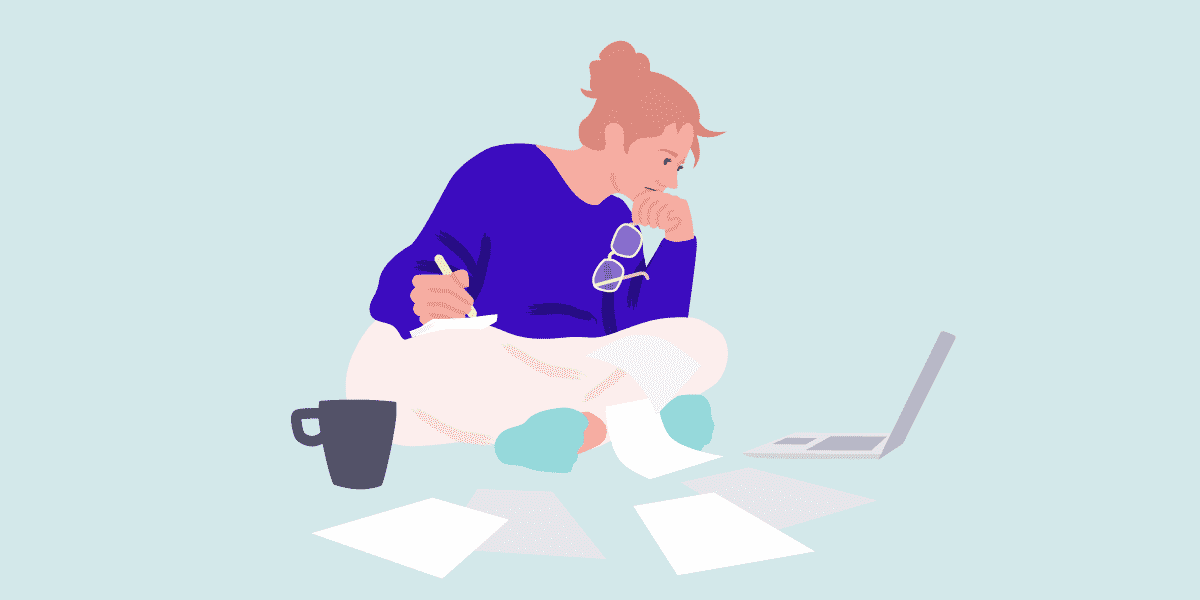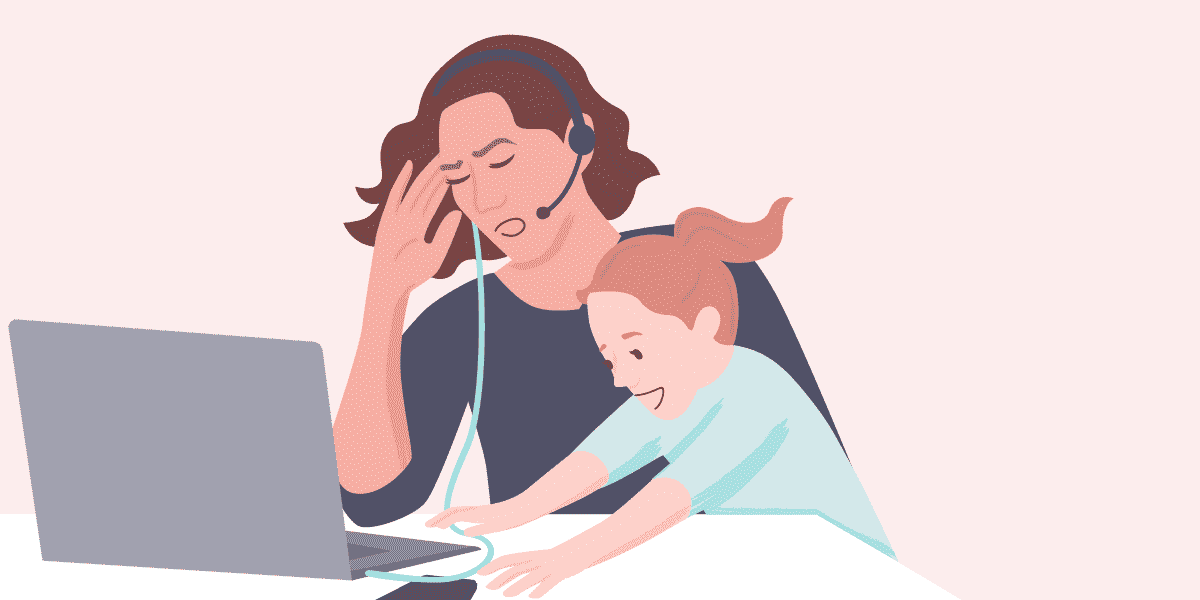Every day we have to think of a multitude of things to do, whether at work or at home. The Covid-19 pandemic has accelerated this situation. With the advent of telecommuting, the line between personal and professional life is becoming thinner and thinner, or even non-existent. This can create an overload of information in our brains, and we can quickly find ourselves overwhelmed: this is called mental overload.
To limit this overheating, Jean-Christophe Beau, an expert in innovation, and Gaël Allain, a doctor in cognitive psychology, have co-founded My Mental Energy. This application, a Gymlib partner, specializes in mental ecology. They give you 6 tips to lighten your mental load at work.
Avoid multitasking

In today's work methods, we tend to practice multitasking, i.e. doing several tasks at the same time. Even if this system seems to have many short-term advantages such as saving time, it is exhausting and inefficient in the long run. By trying to focus on several things at once, our brain gets scattered, and therefore moves slower.
In general, plan time slots dedicated to each of your activities: this will allow you to focus your attention on one task 100%, and avoid dispersion.
The advice of My Mental Energy Pro:
“Learn how to set up your digital tools to avoid being constantly engaged by notifications that cut you off. Try to carve out about 25 minutes of focus time during which you'll only devote yourself to one activity."
And if you can't plan all your tasks, don't hesitate to delegate some of them. Wanting to do a job alone at all costs can create stress and pressure, and you can quickly find yourself overwhelmed. Knowing how to delegate is important and is becoming more and more accepted, as it means that you are realistic about your abilities and workload.
Don’t be (too) perfectionistic

Lightening your mental load also means accepting that not everything is perfect! You may sometimes set your goals too high for what you can accomplish, and as a result, you may feel dissatisfied or even frustrated. It is important to take a step back from your work to see if you are doing too much, as this can generate pressure and mentally exhaust you. By being aware of your strengths and limitations, you will know what you can and cannot achieve, and you will be more effective.
Concerning your objectives, it is the same thing, they must be clear, ambitious but realistic, because reaching them will represent a great source of satisfaction. You will avoid mental overheating and stagnation. Indeed, the brain has difficulty getting started when the instructions and objectives are not clear.
The advice of My Mental Energy Pro:
"Your frontal lobe (the front part of your brain) can be used to define your goal and select the information needed to achieve it. It also eliminates all other sources of information to avoid being distracted (phone calls, emails...). Even if you take the risk of missing some information, your brain will be more efficient and quicker in solving your current problem. The time saved can then be used to process other important information."
Organize your workday
In order to save time, think about organizing your days! Indeed, you can quickly lose track of time, especially when telecommuting, because of a late wake-up call or variable meal times.
To do this, create a to-do list by prioritizing your tasks. This will make you more efficient by prioritizing what is important and putting off what can wait. You will avoid spreading yourself too thin, and therefore accumulating activities that you will not finish in time.
When telecommuting, we also advise you to organize your day as if you were in the office: wake up at the usual time, eat at fixed times, take short breaks during the day, and do some physical activity at lunch or in the evening to limit sedentary behavior.
The advice of My Mental Energy Pro:
"The brain adapts easily to novelty by automating repetitive activities. If an event B occurs after an event A, the brain will easily create a link between the two. In the current period, this automation is complicated: cues are more difficult to identify because of stress and changes. It is therefore important to fix these points of reference, by regularly repeating the same activities, to make them automatic. The freed up resources will allow you to adapt to future changes."
Distinguish between professional and personal life

This subject has been regularly discussed in recent years with the new generation, who are much more flexible about their working hours. With telecommuting, this limit becomes even more blurred.
To remedy this, there are several solutions: respect your working hours, as if you were in the office, and except in extreme emergencies, disconnect permanently once your working day is over. You can give yourself a real moment of rest and let go during the evening.
When telecommuting, try to physically separate your professional and personal life. To do this, set up an office or workspace in your home that will be used only for professional purposes. This way, you can avoid thinking about your work all evening while sitting on the same couch that serves as your office.
The advice of My Mental Energy Pro:
"Learn to mentally acknowledge that an activity is complete, or at least in a stable state (a pending file for example). To do this, take a moment to verbalize the fact that you have finished an activity or to cross it off your to-do list. This allows your brain to materialize the end of it, close unnecessary mental windows and avoid thinking about it again."
Let go
During your day, it is necessary to give yourself small breaks. This can be as simple as taking a five-minute break every two hours of work. Cutting yourself off from your tasks for a few moments will help you be more productive and focused when you return to work.
The advice My Mental Energy Pro:
“If you are having trouble finishing a file and your mind is wandering, try a diversion. Give yourself a little Sudoku-type break during which you will mobilize all your neurons in a very stimulating intellectual activity. You will cut short your ruminations and you will be able to resume your work in the best conditions.”
When your work day is over, disconnect completely. This will allow you to rest both physically and mentally, as work takes its toll on the entire body. You can do this by doing activities that relax and don't work on your work skills. Physical activity, listening to music, or even drawing are good ways to relieve stress and pressure, and to think about something other than work!
The advice of My Mental Energy Pro:
"To function well, your brain needs moments of intellectual relaxation, where your mind can do what it wants. These times of relaxation are used by the brain to structure thought, manage emotions... In this context, physical exercises are particularly recommended because they offer the opportunity for your mind to think about something else!"
Take care of your body
Know that the proper functioning of your brain depends directly on your level of physical fitness. In other words, to take care of your neurons, and therefore be efficient at work, never neglect your:
- nutrition: it is important to eat well, at every meal. Try to eat a balanced diet as much as possible so that you can use your brain effectively.
- physical activity: regular exercise will help you let go and refocus on yourself, as well as making you feel better physically. You will then be able to concentrate fully on your work.
- sleep: it is important to get a good night's sleep in order to gain concentration and efficiency during your working day.
Now that you've read all our tips, all you have to do is implement them! Your colleagues will soon be jealous of your productivity, and will wonder how you can reconcile your meetings, the family errands, and the children's homework...
To help you find a balance at work, and limit mental overload, we advise you to download the My Mental Energy application. Thanks to your Gymlib subscription, you will benefit from the premium version of the application. It includes micro-exercises for concentration, relaxation, mental preparation and sleep improvement.